Nissan Qashqai VS VW ID.7 – Specs, Efficiency & Price Comparison
Which model is the better choice – the Nissan Qashqai or the VW ID.7? We compare performance (190 HP vs 340 HP), boot capacity (504 L vs 532 L), efficiency (5.10 L vs 13.60 kWh), and of course, the price (29300 £ vs 46300 £).
Find out now which car fits your needs better!
The Nissan Qashqai (SUV) is powered by a Petrol MHEV or Full Hybrid engine and comes with a Manuel or Automatic transmission. In comparison, the VW ID.7 (Hatchback) features a Electric engine and a Automatic gearbox.
When it comes to boot capacity, the Nissan Qashqai offers 504 L, while the VW ID.7 provides 532 L – depending on what matters most to you. If you’re looking for more power, you’ll need to decide whether the 190 HP of the Nissan Qashqai or the 340 HP of the VW ID.7 suits your needs better.
There are also differences in efficiency: 5.10 L vs 13.60 kWh. In terms of price, the Nissan Qashqai starts at 29300 £, while the VW ID.7 is available from 46300 £.
Compare all the key specs now and find out which model fits your lifestyle best!
Nissan Qashqai
The Nissan Qashqai stands out in the compact SUV market with its sleek design and versatile features. Its smooth ride and refined interior make it a popular choice for both city driving and weekend adventures. Advanced safety technologies and user-friendly infotainment add to its appeal, ensuring a comfortable and secure driving experience for all passengers.
details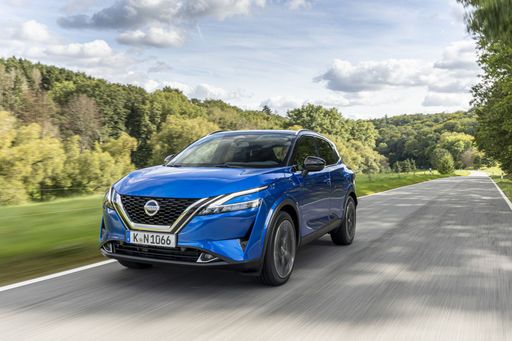 @ Nissan
@ Nissan
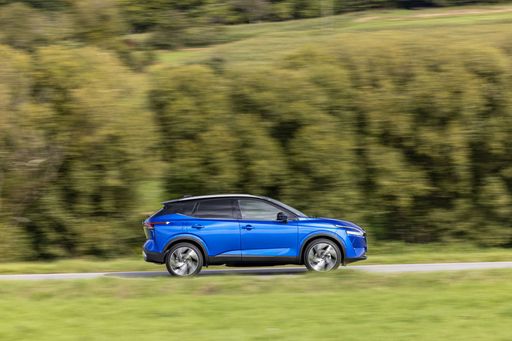 @ Nissan
@ Nissan
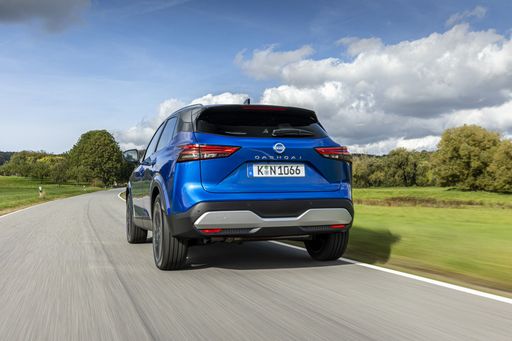 @ Nissan
@ Nissan
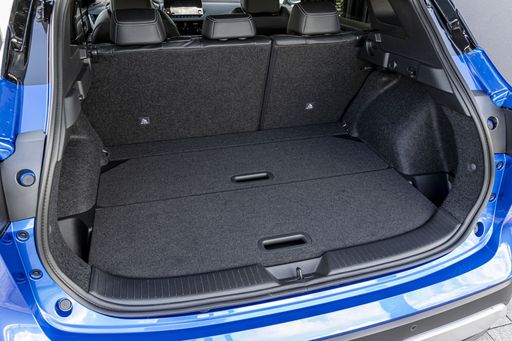 @ Nissan
@ Nissan
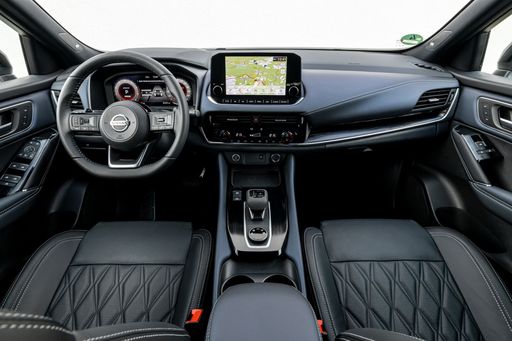 @ Nissan
@ Nissan
VW ID.7
The VW ID.7 represents a significant step forward in Volkswagen's electric vehicle lineup, offering an elegant design combined with advanced technology features. This electric saloon showcases a sleek aerodynamic profile, prioritising both performance and efficiency. Inside, drivers will appreciate the spacious and modern cabin, equipped with intuitive controls and connectivity features for a seamless driving experience.
details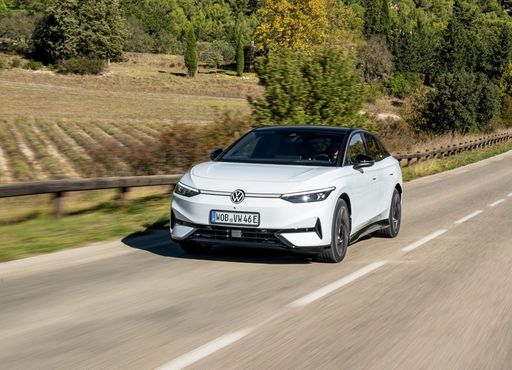 @ Volkswagen.de
@ Volkswagen.de
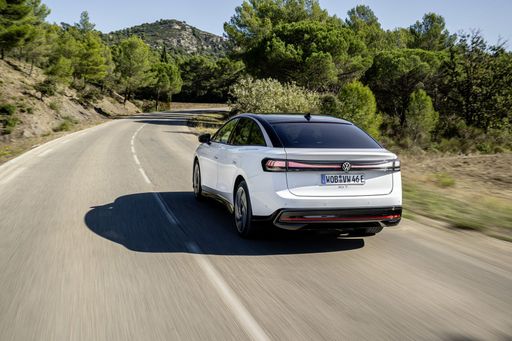 @ Volkswagen.de
@ Volkswagen.de
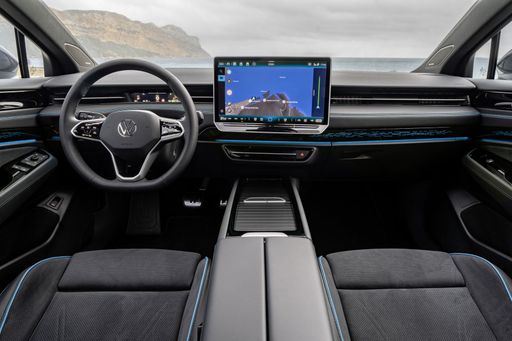 @ Volkswagen.de
@ Volkswagen.de
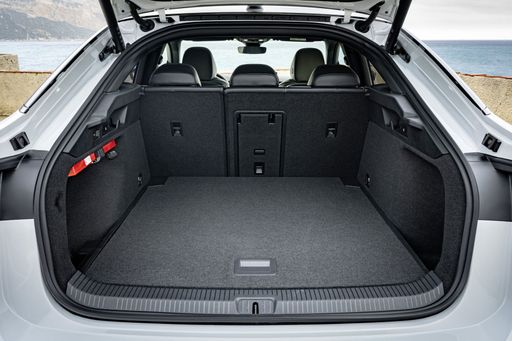 @ Volkswagen.de
@ Volkswagen.de

|

|
|
|
|
Costs and Consumption |
|
|---|---|
|
Price
29300 - 42400 £
|
Price
46300 - 54100 £
|
|
Consumption L/100km
5.1 - 6.8 L
|
Consumption L/100km
-
|
|
Consumption kWh/100km
-
|
Consumption kWh/100km
13.6 - 16.2 kWh
|
|
Electric Range
-
|
Electric Range
595 - 709 km
|
|
Battery Capacity
-
|
Battery Capacity
77 - 86 kWh
|
|
co2
116 - 154 g/km
|
co2
0 g/km
|
|
Fuel tank capacity
55 L
|
Fuel tank capacity
-
|
Dimensions and Body |
|
|---|---|
|
Body Type
SUV
|
Body Type
Hatchback
|
|
Seats
5
|
Seats
5
|
|
Doors
5
|
Doors
5
|
|
Curb weight
1420 - 1665 kg
|
Curb weight
2184 - 2328 kg
|
|
Trunk capacity
479 - 504 L
|
Trunk capacity
532 L
|
|
Length
4425 mm
|
Length
4961 mm
|
|
Width
1835 mm
|
Width
1862 mm
|
|
Height
1625 mm
|
Height
1536 mm
|
|
Payload
466 - 520 kg
|
Payload
456 - 462 kg
|
Engine and Performance |
|
|---|---|
|
Engine Type
Petrol MHEV, Full Hybrid
|
Engine Type
Electric
|
|
Transmission
Manuel, Automatic
|
Transmission
Automatic
|
|
Transmission Detail
Manual Gearbox, CVT, Reduction Gearbox
|
Transmission Detail
Reduction Gearbox
|
|
Drive Type
Front-Wheel Drive, All-Wheel Drive
|
Drive Type
Rear-Wheel Drive, All-Wheel Drive
|
|
Power HP
140 - 190 HP
|
Power HP
286 - 340 HP
|
|
Acceleration 0-100km/h
7.9 - 10.2 s
|
Acceleration 0-100km/h
5.4 - 6.6 s
|
|
Max Speed
170 - 206 km/h
|
Max Speed
180 km/h
|
|
Torque
240 - 330 Nm
|
Torque
545 - 679 Nm
|
|
Number of Cylinders
3 - 4
|
Number of Cylinders
-
|
|
Power kW
103 - 140 kW
|
Power kW
210 - 250 kW
|
|
Engine capacity
1332 - 1497 cm3
|
Engine capacity
-
|
General |
|
|---|---|
|
Model Year
2024
|
Model Year
2023 - 2024
|
|
CO2 Efficiency Class
E, D
|
CO2 Efficiency Class
A
|
|
Brand
Nissan
|
Brand
VW
|
Nissan Qashqai
Exploring the New Nissan Qashqai: A Masterclass in Innovation and Performance
The Nissan Qashqai stands as a testament to the brand's continuous evolution in the competitive SUV market. Building on its robust reputation, the latest models bring a blend of style, efficiency, and groundbreaking technology that cater to the modern driver's needs. As we delve into the technical nuances and innovative features, it becomes evident why the Qashqai remains a top contender in its segment.
Powertrain and Efficiency: A Harmonious Balance
The latest Nissan Qashqai models feature an advanced range of powertrain options, including both mild-hybrid and full-hybrid systems. The 1.3 DIG-T MHEV engines provide power outputs ranging from 140 to 158 PS, ensuring a responsive driving experience while maintaining a remarkable fuel efficiency of 6.3 L/100km for automatic front-wheel drive versions. The full-hybrid 1.5 VC-T e-POWER delivers an impressive 190 PS while achieving a fuel efficiency of just 5.1 L/100km, demonstrating Nissan's commitment to ecological innovation.
Advanced Transmission Systems
Drivers can choose between manual or automatic transmissions, tailored to their driving style. The manual gearbox offers a tactile driving experience, while the automatic options, including a CVT and reduction gear transmission, ensure seamless power delivery and heightened efficiency. For those who seek greater traction and stability, all-wheel drive configurations are also available, enhancing the Qashqai's versatility.
High-Tech Interior: Comfort Meets Connectivity
The Qashqai's interior is a sanctuary of technology and comfort. The SUV features a user-friendly infotainment system with a touchscreen interface, compatible with both Android Auto and Apple CarPlay. The seamless integration of technology extends to advanced driver-assistance systems (ADAS) that include ProPILOT with Navi-link, enhancing convenience and safety during long drives or urban manoeuvres.
Performance and Dynamics: The Driving Experience
When it comes to performance, the Qashqai does not compromise. With acceleration from 0-100 km/h in as little as 7.9 seconds in the more powerful hybrid editions, and a top speed ranging from 170 to 206 km/h, Nissan ensures that excitement is part and parcel of the Qashqai driving experience. This balance of power and control is complemented by a well-tuned suspension system and precise steering response, providing a confident drive whether on highways or country lanes.
Design and Practicality: Where Form Meets Function
Sporting an aerodynamic silhouette, the Qashqai exudes a modern vibe that is both eye-catching and functional. Its dimensions, with a length of 4425 mm and a width of 1835 mm, provide ample cabin space for five passengers, along with a versatile boot capacity of up to 504 litres. These aspects make it an ideal choice for families and adventurers alike.
Conclusion: A Forward-Thinking Choice
The Nissan Qashqai remains a steadfast choice for those seeking an SUV that blends innovative technology with everyday practicality. With its advanced hybrid options and cutting-edge features, it not only meets but often exceeds the demands of today's environmentally conscious and tech-savvy drivers. As Nissan continues to push boundaries, the Qashqai stands as a beacon of what modern SUVs can achieve.
VW ID.7
Introducing the VW ID.7: A Game-Changer in the Electric Car Market
The VW ID.7 represents Volkswagen's commitment to innovation and sustainability in the automotive market. This all-electric vehicle stands out not only for its sleek design but also for its impressive array of technological advancements. In this article, we delve into the technical specifications and innovations that make the ID.7 a remarkable addition to Volkswagen's electric vehicle lineup.
Power and Performance
Under the bonnet, the VW ID.7 is powered by a range of electric motors, offering horsepower between 286 and 340 PS. This provides the perfect blend of power and efficiency, making it an ideal choice for both city driving and long-distance journeys. With a top speed of 180 km/h and a lightning-fast acceleration from 0 to 100 km/h in just 5.4 seconds, the ID.7 doesn’t compromise on performance.
Impressive Range and Efficiency
The VW ID.7 redefines what it means to travel efficiently. Depending on the model, the ID.7 offers an electric range between 595 and 709 km on a single charge, setting new benchmarks for the industry. With energy consumption as low as 13.6 kWh per 100 km, it is one of the most energy-efficient vehicles in its class, making it both environmentally friendly and cost-effective for everyday use. The ID.7 boasts a CO2 efficiency class of A, reflecting its zero-emission status.
Advanced Technology and Safety Features
Volkswagen has equipped the ID.7 with cutting-edge technology designed to enhance the driving experience. The car features advanced driver assistance systems, including adaptive cruise control and lane-keeping assistance. Moreover, its infotainment system is state-of-the-art, offering seamless connectivity and a user-friendly interface. Safety features are also top-notch, ensuring peace of mind for drivers and passengers alike.
Design and Comfort
The ID.7's design is both futuristic and practical. Its streamlined body provides a stylish exterior, while the interior is spacious and comfortable, accommodating up to five passengers effortlessly. With a generous boot capacity of 532 litres, there is plenty of storage for all your needs. The ID.7’s dimensions, measuring 4961 mm in length and 1862 mm in width, make it a substantial vehicle that commands attention on the road.
Efficient Price Point
Despite its high-tech features and impressive performance, the VW ID.7 maintains a competitive price range, starting from €53,995. This makes it accessible to a wide range of customers seeking an eco-friendly vehicle without breaking the bank. Additionally, with monthly costs ranging between €1,197 and €1,372, it's a practical choice for those considering long-term electric vehicle ownership.
Conclusion
In conclusion, the VW ID.7 is a testament to innovation in the electric vehicle sector. Its combination of power, range, and technology sets a new standard for what drivers can expect from an electric car. As Volkswagen continues to pave the way for electric mobility, the ID.7 stands as a beacon of what's possible when cutting-edge technology meets sustainable driving practices.
The prices and data displayed are estimates based on German list prices and may vary by country. This information is not legally binding.
